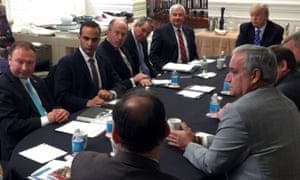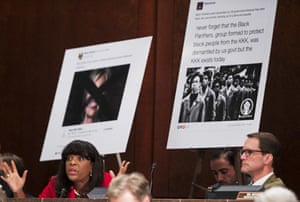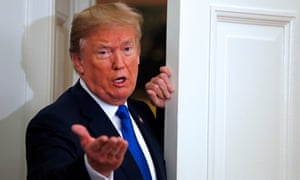For
a moment in court, the mask slipped. Paul Manafort glanced at his
lawyer and smirked, like a TV mafia boss with reasons to be confident.
It was the look of a man who, after decades of work as a lobbyist for murderous dictators in Africa and Asia, was not about to be rattled by the prospect of house arrest.
But less than a mile away, another man displayed rather less equanimity. Donald Trump woke before dawn on Monday and, instead of heading to the Oval Office, lingered in the White House residence. “Trump clicked on the television and spent the morning playing fuming media critic, legal analyst and crisis communications strategist, according to several people close to him,” the Washington Post reported.
Until that moment, the justice department investigation into his election campaign’s alleged collusion with Russia had seemed somewhat theoretical, dismissable by Trump as a “hoax” and “witch hunt”. But here was the concrete of the courthouse, the accused escorted in by marshals, standing before a robed judge, swearing on oath and pleading for liberty. Suddenly Trump understood the five-month investigation by special counsel Robert Mueller – probing whether the American president has been compromised by a foreign power – had entered a new and dangerous phase.
“Overall this week what we learned is that Bob Mueller knows a lot
more about what happened during the presidential campaign than anyone on
the outside thought he did,” said Matthew Miller,
a partner at strategic advisory firm Vianovo and former director of
public affairs at the justice department. “We have an incomplete picture
and we don’t know what the final picture might look like.”But less than a mile away, another man displayed rather less equanimity. Donald Trump woke before dawn on Monday and, instead of heading to the Oval Office, lingered in the White House residence. “Trump clicked on the television and spent the morning playing fuming media critic, legal analyst and crisis communications strategist, according to several people close to him,” the Washington Post reported.
Until that moment, the justice department investigation into his election campaign’s alleged collusion with Russia had seemed somewhat theoretical, dismissable by Trump as a “hoax” and “witch hunt”. But here was the concrete of the courthouse, the accused escorted in by marshals, standing before a robed judge, swearing on oath and pleading for liberty. Suddenly Trump understood the five-month investigation by special counsel Robert Mueller – probing whether the American president has been compromised by a foreign power – had entered a new and dangerous phase.
Manafort, who served Trump’s campaign for five months – as its chairman, and his business associate Rick Gates, who also played a role in the campaign, were indicted on 12 counts including conspiracy against the US, conspiracy to launder money, acting as an unregistered foreign agent, making false statements and failing to report foreign bank and financial accounts.
Frank Figliuzzi, former assistant director for counterintelligence at the FBI, told MSNBC: “If you look at this through a counterintelligence lens, you see the fingerprints of the Russian government here ... He [Manafort] got a primer on how the Russians can influence a campaign when he represented the Ukrainian candidate [Yanukovych] and he saw what Russia could do to influence a campaign. And he liked it.”
Appearing in a tense courtroom on Monday before a packed public gallery, Manafort and Gates pleaded not guilty and were released on multimillion dollar bonds but confined to their homes. Lawyers for Manafort – also among the participants of a June 2016 meeting at Trump Tower with a Kremlin-linked lawyer after Donald Trump Jr was promised “dirt” on rival Hillary Clinton – defended him in a court filing on Thursday as a “successful, international political consultant” who was necessarily involved in foreign financial transactions. US district judge Amy Berman Jackson has set a possible date of 7 May for the trial.
'Trump is treason': heckler throws Russian flags at US president – video
Trump said on Twitter the alleged crimes were “years ago” and insisted there was “NO COLLUSION” between his associates and Russia. He characteristically sought to shift attention to his Democratic opponent, tweeting: “Why aren’t Crooked Hillary & the Dems the focus?????”
The Manafort story broke just before 8am on Monday. In normal circumstances, charges against the former campaign chairman of a sitting president would be devastating enough. But then, around 10.30am, came a bolt from the blue. An unsealed indictment revealed that former Trump campaign adviser George Papadopoulos had pleaded guilty to lying to FBI agents about contacts with people who claimed to have ties to top Russian officials and who were offering “dirt” on Clinton.
The special counsel’s one-two punch was deliberate, Miller believes. “He did the two together to send a very clear message to everyone in the Trump orbit. ‘If you cooperate, you’ll get a very favourable deal’ – I think he probably won’t go to jail – ‘If you lie and obstruct I’m going to throw the book at you and you’re looking at years in jail.”
Alarmingly for the White House, Papadopoulos is now cooperating with Mueller’s investigators and, some speculated, may have worn a wire. The White House predictably sought to distance itself from him. Trump tweeted: “Few people knew the young, low level volunteer named George, who has already proven to be a liar.”
But a photo posted on Trump’s Instagram account shows Papadopoulos sitting at a table with the businessman as well as Jeff Sessions, now the attorney general, and other foreign policy advisers in March last year. According to the court documents, Papadopoulos told the meeting “that he had connections that could help arrange a meeting between then-candidate Trump and President Putin”.

Yet in his testimony to the Senate judiciary committee in June, the attorney general denied knowing anything about contacts between the campaign and Russians. Now Senate Democrats are calling for him to testify again. Senator Al Franken wrote in a letter to Sessions: “This is another example in an alarming pattern in which you, the nation’s top law enforcement officer, apparently failed to tell the truth, under oath, about the Trump team’s contacts with agents of Russia, a hostile foreign power that interfered in the 2016 election.”
Trump himself - who last week claimed to have “one of the great memories of all time” – was vague on the details of the Papadopoulos meeting. As he set off for a 13-day tour of Asia on Friday, he told reporters: “I don’t remember much about that meeting. It was a very unimportant meeting. It took place a long time ago ... All I can tell you is this: There was no collusion. There was no nothing. It’s a disgrace, frankly, that they continue.”
As is his wont, Trump argued that the justice department should look into Clinton and her campaign’s conduct with the Democratic National Committee during the presidential primary race.
As the first anniversary of Trump’s shock win over Clinton approaches, it is clear the Russia affair will hover over most if not all his presidency. This week, appearing before three congressional committees, executives from Facebook, Twitter and Google admitted that their platforms were abused by Russia to inflame existing divisions over issues such as immigration and gun control.
House investigators released a batch of Facebook and Twitter ads – a sample of more than 3,000 turned over to the committee – that demonstrated America’s all-conquering social media had been weaponised against it. One promoted an event to “Support Hillary. Save American Muslims!” with a picture of a woman in a hijab beside Clinton. Another for a group called “Stop AI” urged viewers to “like and share if you want burqa banned in America,” implying that the all-enveloping garment could be hiding a terrorist.

However, there was not conclusive proof that Moscow had conspired on behalf of Trump alone. Facebook general counsel Colin Stretch testified that Russian activity had continued after the election “fomenting discord about the validity” of Trump’s victory.
Some commentators also suggested that the week’s developments in the Mueller investigation were not as brutal for Trump as they first appeared. Marc Thiessen, a fellow at the American Enterprise Institute thinktank and former chief speechwriter for George W Bush, argued that the Papadopoulos case was an example of incompetence rather than malevolence.
“There’s still no more public evidence of criminal collusion with Russia than there was before charges were brought,” Thiessen wrote in the Washington Post. “But there is plenty of evidence that the Trump campaign had catastrophically bad judgment in choosing its most senior and junior advisers – and that Russia’s spy network sought to exploit that weakness.”
What seems certain, however, is that these are merely the first pieces in a sprawling jigsaw puzzle. Until Monday, no one outside the special counsel’s office even knew that Papadopoulos was a piece in that puzzle. Former national security adviser Michael Flynn is expected to come under Mueller’s scrutiny over his associations with Moscow.
Miller said: “The biggest question in American politics is whether Flynn is cooperating with Bob Mueller or not. My guess is that he’s either cooperating or trying to get a pardon from Trump – which is a very dangerous thing.”
Is the Russia investigation, probably the most important ever conducted by the justice department, closer to bringing down the Trump presidency than it was a week ago? Sipher noted that his demise has been widely predicted before yet somehow he manages to survive – until the day he doesn’t.
“It’s like hitting a boulder with a hammer 1,000 times and it doesn’t break,” he said. “Then you hit it the 1,001st time and it smashes to pieces. Its hard to predict.”

No comments:
Post a Comment